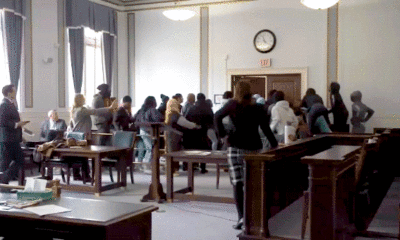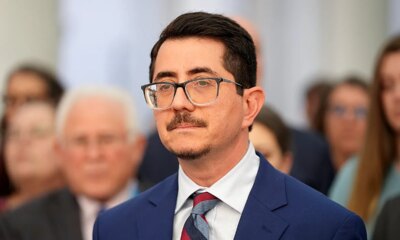Sports
UFC star Conor McGregor rips pro-Hamas, Hezbollah protests in Ireland

Conor McGregor on Saturday ripped pro-Hamas and pro-Hezbollah demonstrators who raised the terrorist groups’ flags in a rally that took place in Ireland.
McGregor’s social media post came as Hamas released four female hostages as part of a ceasefire deal with Israel. McGregor appeared to be enraged over the rally.
Conor McGregor is seen during the 75th annual Cannes Film Festival on May 25, 2022 in Cannes, France. (Edward Berthelot/GC Images)
“To raise the flag of a terrorist organization on Irish soil must become a major crime in the eyes of our state,” he wrote in a post on X. “It will not be tolerated nor lauded!
“Raise a country flag, off your own person, and off of government buildings, yes, no problem. Raise the flag of radicalized terror organizations off of the same.. Big problem.”
One of McGregor’s biggest rivals, Khabib Nurmagomedov, praised Ireland on Saturday for being pro-Palestinian. His remarks came as he saw his cousin Usman Nurmagomedov defeat Irishman Paul Hughes for the Bellator’s lightweight championship.
Conor McGregor takes part in a KnuckleMania V boxing news conference on Thursday, Jan. 23, 2025 in Bensalem, Pennsylvania. (AP Photo/Matt Rourke)
AUBURN’S BRUCE PEARL SLAMS HAMAS TERRORISTS AFTER 3 ISRAELI HOSTAGES ARE RELEASED
“I know this is not my time to talk, I just want to say one thing,” Khabib Nurmagomedov said, via Bloody Elbow. “With all the things between me and [Conor McGregor] when we were fighting. Don’t forget, Ireland is the biggest supporter in the world for Palestine. Don’t forget about this. We love you guys! You, your government, everybody.
“When we’re inside the cage, it’s only competition. MMA, all about respect. We love you guys because you guys support our brother[s] in Palestine.”
Buses carrying Palestinian security prisoners are greeted by a crowd after being released from an Israeli prison following a ceasefire agreement with Israel, in the West Bank city of Ramallah on Saturday, Jan. 25, 2025. (AP Photo/Nasser Nasser)
Later Sunday, Israel and Hamas reached a deal to release hostages and allow Palestinians to return to the Gaza Strip.
Follow Fox News Digital’s sports coverage on X, and subscribe to the Fox News Sports Huddle newsletter.

Sports
NBA player calls for Hawks to cancel their ‘Magic City’ strip club promotional night out of respect for women

NEWYou can now listen to Fox News articles!
An NBA player has taken exception to an Atlanta Hawks promotional night, which is a nod to a famed strip club in the city.
The Hawks have “Magic City Night” scheduled for March 16 against the Orlando Magic, but a player for neither team isn’t too fond of paying tribute to a strip club, which has been famed for its late-night stories involving athletes, celebrities and more.
While the Hawks call it an ode to a “cultural institution,” San Antonio Spurs center Luke Kornet shared his displeasure in a letter posted on Medium.
Luke Kornet of the San Antonio Spurs reaches for the ball during the third quarter against the Brooklyn Nets at Barclays Center on Feb. 26, 2026 in the Brooklyn borough of New York City. (Ishika Samant/Getty Images)
Kornet, a nine-year veteran and 2024 NBA champion with the Boston Celtics, called for the Hawks’ promotional night to be canceled later this month, saying that it is disrespectful to women to honor the strip club.
“In its press release, the Hawks failed to acknowledge that this place is, as the business itself boasts, “Atlanta’s premier strip club.” Given this fact, I would like to respectfully ask that the Atlanta Hawks cancel this promotional night with Magic City,” Kornet wrote in his post.
“The NBA should desire to protect and esteem women, many of whom work diligently every day to make this the best basketball league in the world. We should promote an atmosphere that is protective and respectful of the daughters, wives, sisters, mothers, and partners that we know and love.”
The Hawks boasted about the theme night in its press release, including a live performance by famous Atlanta rapper T.I., a co-branded, limited-edition hoodie and even the establishment’s “World Famous” lemon-pepper chicken wings in the arena.
A general view of signage with the State Farm Arena logo on Nov. 14, 2025, outside State Farm Arena, in Atlanta, GA. (Erica Denhoff/Icon Sportswire)
“This collaboration and theme night is very meaningful to me after all the work that we did to put together ’Magic City: An American Fantasy’,” said Hawks principal owner, filmmaker and actor, Jami Gertz, said in a press release. “The iconic Atlanta institution has made such an incredible impact on our city and its unique culture.”
Kornet wrote that allowing the night to continue “without protest would reflect poorly on us as an NBA community, “specifically in being complicit in the potential objectification and mistreatment of women in our society.”
Kornet wrote that “others throughout the league” were surprised by the Hawks’ decision to have this promotional night.
“We desire to provide an environment where fans of all ages can safely come and enjoy the game of basketball and where we can celebrate the history and culture of communities in good conscience. The celebration of a strip club is not conduct aligned with that vision,” he wrote.
Luke Kornet of the San Antonio Spurs defends against the Charlotte Hornets during their game at Spectrum Center on Jan. 31, 2026 in Charlotte, North Carolina. (Jacob Kupferman/Getty Images)
The Hawks have seen good reception for the promotional night, as Tick Pick reported a get-in price was initially $10 for the game and has since skyrocketed to $94.
Kornet is in his first season with the Spurs, his sixth NBA team, where he has played mainly in a bench role. He averages 7.1 points and 6.5 rebounds per game across 50 contests.
Follow Fox News Digital’s sports coverage on X and subscribe to the Fox News Sports Huddle newsletter.
Sports
Shaikin: Clayton Kershaw’s ‘perfect’ ending has one final chapter in WBC

SCOTTSDALE, Ariz. — How do you improve on the perfect ending?
Clayton Kershaw stood in the desert heat Monday, wearing a far darker shade of blue than the Dodgers do. He does not need a medal, or a chance to fail. His election to the Hall of Fame will be a formality.
In his farewell year, the Dodgers won the World Series, becoming baseball’s first back-to-back champions in 25 years. He secured a critical out. He bathed in adoration at the championship rally, and he told the fans he would be one of them this year.
“I’m going to watch,” he hollered that day, “just like all of you.”
Four months later, he was back in uniform.
He wore a dark blue jersey with red-and-white piping. As Team USA ran through its first World Baseball Classic workout, Kershaw participated in pitchers’ fielding practice and shagged fly balls during batting practice. He could have been home with his five kids, and instead he was rushing off the mound to take a throw at first base.
That November night in Toronto, as it turned out, was not the last time we would see him in uniform.
“Feels good,” he said Monday. “I wouldn’t put on a uniform for anything else. This is a special thing.”
He put the World Baseball Classic into red, white and blue perspective.
“It’s a bucket list thing for me,” he said.
He is either self-deprecating or painfully honest about his capabilities right now, or perhaps a little of both.
The last World Baseball Classic came down to Shohei Ohtani pitching to Mike Trout. This one could come down to Kershaw pitching to Ohtani.
“I think, for our country’s sake, it’s probably better if I don’t,” Kershaw said.
Former Dodgers pitcher Clayton Kershaw fields a ground ball during a workout at Papago Park Sports Complex on Monday.
(Chris Coduto / Getty Images)
Never say never. Team USA planned to run a tremendous rotation of Tarik Skubal, Paul Skenes, Joe Ryan and Logan Webb, but now Skubal says he will pitch just once in the tournament. Skenes says he’ll pitch twice. Ryan says he won’t pitch in the first round, at least.
Kershaw might be needed beyond the role he was promised: save the team from using the current major league pitchers in blowouts or extra innings.
In 11 career at-bats against Kershaw, Ohtani has no hits. Kershaw won’t duck the assignment if gets it, but he considers it so unlikely he is happy to share his game plan publicly.
“It’s throw it, pitch away, play away, hope he flies out to left,” Kershaw said. “Don’t throw it in his barrel.
“I can’t imagine, if it comes down to USA versus Japan, with the arms that we have, that I’ll be needed. But I’ll be ready.”
Kershaw’s average fastball velocity dropped to 89 mph last season, but he led the majors in winning percentage. He could eat innings for some team — maybe even the Dodgers, with Blake Snell and Gavin Stone all but certain to be unavailable on opening day.

Dodgers pitcher Clayton Kershaw, right, celebrates with teammates after the Dodgers defeated the Toronto Blue Jays for the 2025 World Series title.
(Robert Gauthier / Los Angeles Times)
But, even with his success last year and even with the joy of wearing a uniform once again, he insists he isn’t interested in pitching beyond the WBC.
“I don’t want to,” he said. “You can’t end it better than I did last year. I had a great time last year. It was an absolute blast and honor to be on that team. I think that was the perfect way to end it. Honestly, I don’t know if I would have enough in the tank to pitch for a full season again. I’m really at peace with that decision.
“This is kind of a weird one-off thing, but you can’t really turn down this opportunity. It wasn’t easy to get ready for this, with no motivation for a season, but I actually am in a pretty good spot with my arm. I’ll be fine. If they need me, I’ll be ready.”
Kershaw said he has kept in touch with his old Dodgers teammates, with some connecting on video calls from the weight room or clubhouse at Camelback Ranch. He arrived in the Phoenix area two days before the workout, but he skipped a trip to Camelback Ranch.
“I’ve thought about it,” he said. “I miss the guys. I think it’s probably just better, at least for this first year, for me mentally to just stay away, just for spring training.”
Kershaw said he would be at Dodger Stadium for the championship ring ceremony March 27.
He is content with what he calls “Dad life.” He and his wife, Ellen, just welcomed their fifth child, and Dad life includes lots of shuttles to baseball and basketball practice.
“I run an Uber service,” Kershaw said.
This wouldn’t be a Dodgers story these days without some reference to the team’s big spending so, for what it’s worth, Kershaw spent some time Tuesday chatting with Skubal, who will be the grand prize on the free-agent market next winter, or whenever the likely lockout might end.
That’s a rational explanation, Kershaw says, for Skubal pitching just once in the WBC.
“Everybody knows the situation he is in, contract-wise,” Kershaw said. “Any innings we can get out of him is a huge bonus to this team. He’s great. Super competitive. We’re honored to have him.”
Should we assume Skubal will be pitching for the Dodgers next season? Kershaw laughed.
“No comment,” he said, then walked away to get ready for the first game of his post-retirement life.
Sports
Charles Barkley scolds sports fans for getting wrapped up in Olympic hockey frenzy

NEWYou can now listen to Fox News articles!
Basketball Hall of Famer Charles Barkley sounded off on the frenzied reactions to the U.S. men’s hockey team getting invited to the White House by President Donald Trump.
Trump talked to the Olympic gold medal-winning team immediately after they defeated Canada in overtime last weekend. He said they would be invited to his State of the Union address and added that he needed to invite the women’s team as well or he would be “impeached.”
Charles Barkley sits courtside against the Minnesota Timberwolves during an NBA Cup game at Mortgage Matchup Center on Nov. 21, 2025. (Mark J. Rebilas/Imagn Images)
Trump critics took the joke as a shot at the women’s team, which sparked questions from NHL and Professional Women’s Hockey League reporters as the players returned to their respective club teams.
“I’m proud of the United States men. I’m proud of the United States women. You should have invited both of them to the White House, but it shouldn’t have been disrespect, misogyny,” Barkley said on the “Steam Room” podcast. “Like, yo, man, why do y’all have to mess everything up? Everything isn’t Democrat, Republican, conservative, liberal. That’s why we got this divided, screwed up country. Stop it man. Because, you know, the public, they’re idiots. They’re fools. They can’t think for themselves. I know y’all say stuff to trigger them. Y’all say stuff and y’all know they’re going to be fools.”
Barkley lamented that the average person would get riled up over the supposed controversy.
The U.S. team poses for a group photo after defeating Canada in the men’s ice hockey gold medal game at the 2026 Winter Olympics. Milan, Italy, on Feb. 22, 2026. (Luca Bruno/AP Photo)
“We don’t have to fall for stupidity. But we do – that’s my point. These people out here are stupid. They need something to trigger them. Just because they want us to be stupid. We don’t have to be stupid. He should have invited both teams to the White House. Simple as that. Guys who didn’t want to go shouldn’t have to explain why they didn’t go.”
The former Philadelphia 76ers, Houston Rockets and Phoenix Suns star made clear he would go to the White House regardless of whether Trump was in office.
“I’ve said this before, I’m not a Trump guy. But if I got invited to the White House, I would go. I’m not a Trump guy – I want to make that clear. But I respect the office,” Barkley said. “He’s the president of the United States. But if guys don’t want to go, I understand that too. It doesn’t have to be a talking point. It doesn’t have to be un-American.
Megan Keller (5) celebrates with a flag alongside Cayla Barnes (3) of Team United States after scoring the game-winning goal in overtime during the women’s gold medal match against Canada on Day 13 of the Milan Cortina 2026 Winter Olympic Games at Milan Santagiulia Ice Hockey Arena in Milan, Italy, on Feb. 19, 2026. (Sarah Stier/Getty Images)
CLICK HERE TO DOWNLOAD THE FOX NEWS APP
“I just wish y’all would stop falling for the stupidity.”
Follow Fox News Digital’s sports coverage on X and subscribe to the Fox News Sports Huddle newsletter.
-

 World5 days ago
World5 days agoExclusive: DeepSeek withholds latest AI model from US chipmakers including Nvidia, sources say
-

 Massachusetts6 days ago
Massachusetts6 days agoMother and daughter injured in Taunton house explosion
-

 Denver, CO6 days ago
Denver, CO6 days ago10 acres charred, 5 injured in Thornton grass fire, evacuation orders lifted
-

 Louisiana1 week ago
Louisiana1 week agoWildfire near Gum Swamp Road in Livingston Parish now under control; more than 200 acres burned
-

 Oregon4 days ago
Oregon4 days ago2026 OSAA Oregon Wrestling State Championship Results And Brackets – FloWrestling
-

 Technology1 week ago
Technology1 week agoArturia’s FX Collection 6 adds two new effects and a $99 intro version
-

 News1 week ago
News1 week agoVideo: How Lunar New Year Traditions Take Root Across America
-

 Florida2 days ago
Florida2 days agoFlorida man rescued after being stuck in shoulder-deep mud for days


















